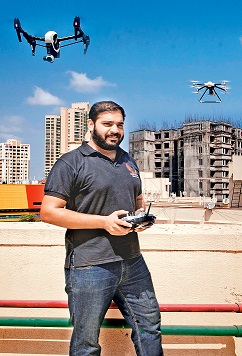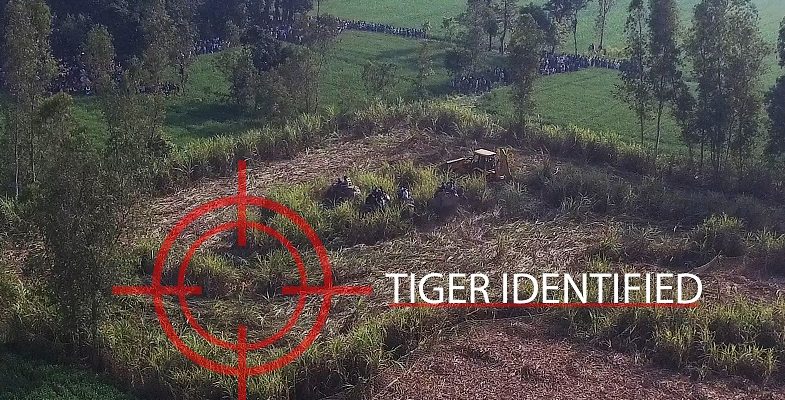When Rahat Kulshreshtha (Media Studies – Television Production BA, 2010) thinks back to his days at the University of Westminster, it is the morning walk from Northwick Park Tube station to the ‘Street’ in the Harrow campus that he remembers with real fondness. This is the time where he reflected, made decisions, and day-dreamed about his future career in the film industry.
‘A lot of the time that journey involved running to make it in time for class, but I remember thinking about some of my most crucial decisions as a student during that short walk. I only realised this on my recent visit to the campus when I found myself thinking about the bigger questions in life during that walk once again!’
At that time, Rahat was studying for his BA in Media Studies – Television Production and had his heart set on making films. This had been his ambition for as long as he could remember and led to him leaving his home in India to study in the UK.
He found London an exhilarating place to live and study, right in the heart of the media and film industry (with BBC’s Broadcasting House just around the corner from the University of Westminster’s central London campuses), and welcomed the diverse social experience of living in International Students House. He also threw himself into his studies, enjoying the free reign his tutors gave him to explore film-making and the hands-on practical approach to the course.
‘There were very few barriers that were set on projects, so you really got to choose, not just the subject that you wanted to work on, but everything else in the ecosystem too. The team, the people, the location. To be given all the freedom to experiment and yet deliver quality content has allowed me to continue experimenting with what I’m doing now. But being in London and studying media has an added advantage no other city has to offer – the amount of opportunity waiting right outside your University gate is incredible.’
After graduating, Rahat used the skills and confidence he had gained at Westminster to find employment in the competitive film industry as a post-production assistant for Warp Films – the award-winning production company behind This is England, Four Lions and Tyrannosaur – and as a production assistant for Bangalore-based advert production house, Nirvana Films. Then in 2013 he was offered a prestigious scholarship for the Young India Fellowship – a postgraduate diploma programme in Liberal Studies at Ashoka University.
But his career took an unexpected turn when, one day, he was filming a music video for New Delhi music artist Shrey Singhal and wanted some aerial shots over the Noida Expressway. He found himself coming up against many boundaries: the expense and red tape of hiring a helicopter, and the quality of footage shot 2,000 feet high. Unwilling to give up, he applied his typical problem-solving approach and found the answer – Unmanned Aerial Vehicles – commonly known as drones. He bought his own for the project; and Quidich was born.
‘Quidich started off as a drone filming company, extending from my experiences and knowledge gained from my degree at Westminster. Very quickly we realised that the potential of drones extended far beyond filming and a personal transition began from a film-maker to an entrepreneur. Today, Quidich is one of India’s largest aerial solutions business that provides services from film-making and corridor mapping to vertical tower inspections.’
Rahat’s entrepreneurial instincts kicked in and he grasped the opportunity, forming a team with fellow students he met while studying for the Young India Fellowship. Although Quidich retains a significant foothold in film and media, Rahat found himself working on projects that he could never have dreamed of.
Most recently, Rahat assisted in the capture of a man-eating tiger that had escaped from the Pilibhit Tiger Reserve in Uttar Pradesh. The tiger had been loose for months and had already claimed the lives of six people from the local population. After traditional methods failed to capture the tiger, Quidich joined forces with the World Wildlife Fund, and within 24 hours she was found using Rahat’s drones. This potentially saved the lives of more locals and ended the drama in a humane and safe way, with the tiger tranquilised and transported to a zoo. The conservators of the area now plan to use drones to monitor animals.
 But while Quidich might have led him away from those aspirations Rahat had as a young boy, it has actually embedded his career in the film and media industry as an expert in a growing and innovative technology. He has found himself immersed in his love of film in a new and unexpected way… and the theme of big cats plays another part in his career story.
But while Quidich might have led him away from those aspirations Rahat had as a young boy, it has actually embedded his career in the film and media industry as an expert in a growing and innovative technology. He has found himself immersed in his love of film in a new and unexpected way… and the theme of big cats plays another part in his career story.
‘After multiple unsuccessful job applications to the BBC while I was in England, one of the proudest moments at Quidich for me was when life came a full circle and I had the opportunity to shoot with the BBC team for Planet Earth II in Ladakh for the episode with snow leopards. We filmed the terrain around the Ladakh region to establish the vastness and beauty of the Himalayas.’
And his advice to any young people still finding their way in their career? ‘Be OK with change. I knew from sixth grade that I wanted to be a film-maker. I finished school and still wanted to be a film-maker. I applied to college only for film-making courses and worked in the British film industry for two years, but in less than five years of leaving University, I’m not a film-maker anymore and I still absolutely love what I do!’
- Mentor the next generation - 1 August2018
- Making a difference in Hong Kong - 8 May2018
- My journey to Mumbai with Westminster Working Cultures - 15 March2018
